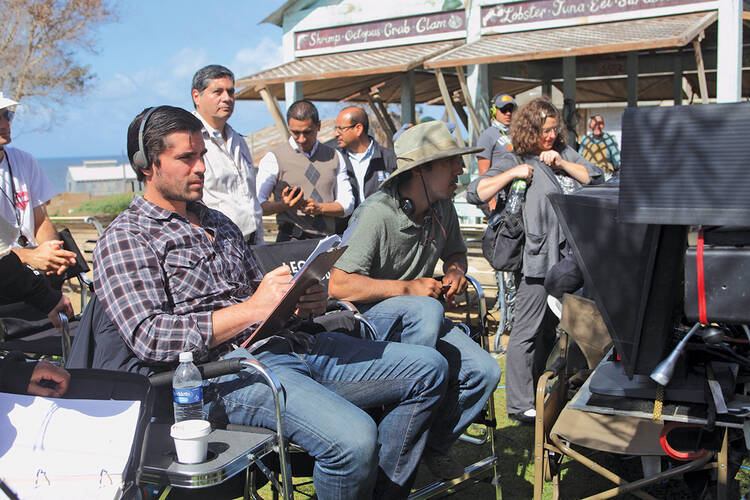If you asked 100 people to name the biggest Christian movie or television show in the last year, many would probably name “A.D.”, NBC’s miniseries about the birth of Christianity after the Passion. Others might mention “St. Vincent,” last fall’s Bill Murray vehicle about a misanthrope with a kind heart, or “Heaven Is for Real,” the 2014 film based on the bestselling book of the same name about a little boy who has a near-death experience. Undoubtedly some would point to one of the many horror films of the year—the supernatural being chocolate to Christianity’s peanut butter as far as Hollywood is concerned. (Add Anthony Hopkins and you can have a genuine Hollywood s’more.)
Almost no one, I suspect, will mention the late spring release Little Boy. In fact, if I were a betting man I would say the hurricane that is “Avengers: Age of Ultron” has drawn so much oxygen and energy to itself that most people probably will never hear of “Little Boy,” ever. And that’s a crying shame, because this World War II pic about a little boy desperate to find a way to bring his father home is the Catholic film we all should see. Even knowing that Oscar season will bring Martin Scorsese’s biopic “Silence” about the Catholic martyrs in Japan, I would still wager that “Little Boy” is going to be the best religious film of the year.
Pepper Busbee is an unusually tiny child with an outsized imagination. Feeding on his “Ben Eagle the Magician” comic books, Pepper has wonderful fantasies about his father and himself partnering on various adventures, always saving one another from otherwise certain doom.
When Pepper’s father is drafted and becomes a prisoner of war in the Philippines, a conversation with Father Oliver, a local Catholic priest (played by the wonderful Tom Wilkinson), leads Pepper to believe that if he performs all seven corporal works of mercy (plus one), his tiny mustard seed of faith will grow to the size where he can move mountains and save his father.
I say the seven corporal works “plus one.” In fact the central work of mercy of the film is not any of the standard seven, but an eighth added by the writer/director Alejandro Monteverde—to befriend the persecuted. The Japanese-American Mr. Hashimoto returns home after years in internment to find himself universally reviled. One man wants him murdered as revenge for the death of his son at Pearl Harbor. Pepper’s brother repeatedly tries to drive him out. No one supports him except Father Oliver, who insists that Pepper’s journey to a mighty faith can begin only after a change of heart toward Hashimoto.
It is an interesting addition to the classic corporal works, this idea of befriending not only the sick or the imprisoned but those society chooses to persecute and oppress. Indeed, as we follow Pepper on his journey, it becomes evident that Monteverde is on to something. Whatever its justification, prejudice is a blight on human society, a cause of catastrophic horrors in our world. One cannot be merciful and show no concern for the many against whom that world discriminates.
Of course, no amount of merciful acts is likely to actually move a mountain. As Father Oliver tries to explain to Pepper, such possibilities are entirely in God’s hands, not our own. And it is for Pepper to discover just how painfully mysterious God can be.
But in the film, having such wide-eyed, full-hearted faith is not naïve but powerful in its ability to change people’s hearts. Through a strange coincidence, Pepper begins to believe that his work has actually given him magical powers. We see him spending days desperately trying to exercise those abilities, each effort so fierce it is painful to watch. And little by little, the people of the town, who until this point have looked upon Pepper largely with derision, are caught up in his witness—as are we.
Ninety-nine percent of religious films founder between the Scylla and Charybdis of cheesy and preachy. Either the characters are whitewashed “Leave It to Beaver” clean, or the film is just a moral in (semi-) human clothing. The very designation of many films as “religious” or “Christian” often indicates they will be dumbed down, antirational or stubbornly (if not offensively) naïve.
“Little Boy” is that rare exception that avoids the pitfalls to tell a story that is sweet, gut-wrenching and deeply spiritual. The film invites us into a wonderful contemplation of that blessed kingdom of mercy to which Jesus is calling us. It is a film to see and to savor. Perhaps it even has a mountain to move of its own: Might Pope Francis, as we move toward the Jubilee Year of Mercy, consider adding “befriending the persecuted” or “championing the oppressed” as a corporal work for the world today?








